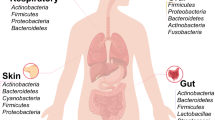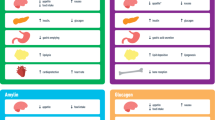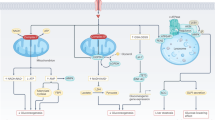Abstract
Objective:
Studies have indicated that obesity is associated with a higher risk of colorectal cancer. This study was performed to determine the effect of diet-induced obesity on the formation of azoxymethane (AOM)/dextran sodium sulfate (DSS)-induced colon tumors and to identify adiposity-related mechanisms.
Methods:
Male A/J mice were placed on either a high-fat diet (HFD; 45% of total calories from fat) or a normal diet (ND; 15% of calories from fat) for 12 weeks. To induce colon tumors, AOM was administered at a dose of 10 mg/kg body weight, followed by two cycles of DSS supply.
Results:
Study results indicated that the HFD group had twofold higher numbers of colonic tumors, as compared with the ND group. The HFD group also had significantly increased body weight and epididymal fat weight, which were associated with increases of serum insulin, insulin-like growth factor-1, leptin, epididymal fat pad leptin mRNA and colonic leptin receptor (Ob-R) mRNA. Animals on HFD showed higher expressions of Ob-R, insulin receptor, phosphorylated Akt, phosphorylated extracellular signal-regulated kinases, Bcl-xL and Cyclin D1 proteins in the colon.
Conclusion:
The results suggest that HFD-induced obesity facilitates colon tumor formation, possibly by regulating downstream targets of circulating adiposity-related factors via receptor-mediated signaling of the phosphatidylinositol 3-kinase/Akt pathway.
This is a preview of subscription content, access via your institution
Access options
Subscribe to this journal
Receive 12 print issues and online access
$259.00 per year
only $21.58 per issue
Buy this article
- Purchase on Springer Link
- Instant access to full article PDF
Prices may be subject to local taxes which are calculated during checkout





Similar content being viewed by others
References
World Health Organization. Fact Sheet No. 297 2009, http://www.who.int/mediacentre/factsheets/fs297/en/print.html.
Larssom SC, Wolk A . Obesity and colon and rectal cancer risk: a meta-analysis of prospective studies. Am J Clin Nutr 2007; 86: 556–565.
Moghaddam AA, Woodward M, Huxley R . Obesity and risk of colorectal cancer: a meta-analysis of 31 studies with 70 000 events. Cancer Epidemiol Biomarkers Prev 2007; 16: 2533–2547.
Calle EE, Kaaks R . Overweight, obesity and cancer: epidemiological evidence and proposed mechanisms. Nat Rev Cancer 2004; 4: 579–591.
Drew JE, Farquharson AJ, Padidar S, Duthie GG, Mercer JG, Arthur JR et al. Insulin, leptin, and adiponectin receptors in colon: regulation relative to differing body adiposity independent of diet and in response to dimethylhydrazine. Am J Physiol Gastrointest Liver Physiol 2007; 293: G682–G691.
Pisani P . Hyper-insulinaemia and cancer, meta-analyses of epidemiological studies. Arch Physiol Biochem 2008; 114: 63–70.
Renehan AG, Frystyk J, Flyvbjerg A . Obesity and cancer risk: the role of the insulin-IGF axis. Trends Endocrinol Metab 2006; 17: 328–336.
Pais R, Silaghi H, Silaghi AC, Rusu ML, Dumitrascu DL . Metabolic syndrome and risk of subsequent colorectal cancer. World J Gastroenterol 2009; 15: 5141–5148.
Vendrell J, Broch M, Vilarrasa N, Molina A, Gomez JM, Gutierrez C et al. Resistin, adiponectin, ghrelin, leptin, and proinflammatory cytokines: relationships in obesity. Obes Res 2004; 2: 962–971.
Fantuzzi G . Adipose tissue, adipokines, and inflammation. J Allergy Clin Immunol 2005; 115: 911–919.
Stattin P, Lukanova A, Biessy C, Söderberg S, Palmqvist R, Kaaks R et al. Obesity and colon cancer: does leptin provide a link? Int J Cancer 2004; 109: 149–152.
Chia VM, Newcomb PA, Lampe JW, White E, Mandelson MT, McTiernan A et al. Leptin concentrations, leptin receptor polymorphisms, and colorectal adenoma risk. Cancer Epidemiol Biomarkers Prev 2007; 16: 2697–2703.
Yakar S, Nunez NP, Pennisi P, Brodt P, Sun H, Fallavollita L et al. Increased tumor growth in mice with diet-induced obesity: impact of ovarian hormones. Endocrinology 2006; 147: 5826–5834.
Becker S, Dossus L, Kaaks R . Obesity related hyperinsulinaemia and hyperglycaemia and cancer development. Arch Physiol Biochem 2009; 115: 86–96.
Huang XF, Chen JZ . Obesity, the PI3K/Akt signal pathway and colon cancer. Obes Rev 2009; 10: 610–616.
Tu Y, Gardner A, Lichtenstein A . The phosphatidylinositol 3-kinase/AKT kinase pathway in multiple myeloma plasma cells: roles in cytokine-dependent survival and proliferative responses. Cancer Res 2000; 60: 6763–6770.
Wang L, Cao XX, Chen Q, Zhu TF, Zhu HG, Zheng L . DIXDC1 targets p21 and cyclin D1 via PI3K pathway activation to promote colon cancer cell proliferation. Cancer Sci 2009; 100: 1801–1808.
Ames BN . DNA damage from micronutrient deficiencies is likely to be a major cause of cancer. Mutat Res 2001; 475: 7–20.
Pietinen P, Malila N, Virtanen M, Hartman TJ, Tangrea JA, Albanes D et al. Diet and risk of colorectal cancer in a cohort of Finnish men. Cancer Causes Control 1999; 10: 387–396.
Neugut AI, Garbowski GC, Lee WC, Murray T, Nieves JW, Forde KA et al. Dietary risk factors for the incidence and recurrence of colorectal adenomatous polyps. A case-control study. Ann Intern Med 1993; 118: 91–95.
Pan SY, DesMeules M . Energy intake, physical activity, energy balance, and cancer: epidemiologic evidence. Methods Mol Biol 2009; 472: 191–215.
Palmqvist R, Hallmans G, Rinaldi S, Biessy C, Stenling R, Riboli E et al. Plasma insulin-like growth factor 1, insulin-like growth factor binding protein 3, and risk of colorectal cancer: a prospective study in northern Sweden. Gut 2002; 50: 642–646.
Schoen RE, Tangen CM, Kuller LH, Burke GL, Cushman M, Tracy RP et al. Increased blood glucose and insulin, body size, and incident colorectal cancer. J Natl Cancer Inst 1999; 91: 1147–1154.
Miyamoto S, Yasui Y, Tanaka T, Ohigashi H, Murakami A . Suppressive effects of nobiletin on hyperleptinemia and colitis-related colon carcinogenesis in male ICR mice. Carcinogenesis 2008; 29: 1057–1063.
Ogunwobi OO, Beales IL . The anti-apoptotic and growth stimulatory actions of leptin in human colon cancer cells involves activation of JNK mitogen activated protein kinase, JAK2 and PI3 kinase/Akt. Int J Colorectal Dis 2007; 22: 401–409.
Singh J, Hamid R, Reddy BS . Dietary fat and colon cancer: modulation of cyclooxygenase-2 by types and amount of dietary fat during the postinitiation stage of colon carcinogenesis. Cancer Res 1997; 57: 3465–3470.
Tsukumo DM, Carvalho-Filho MA, Carvalheira JB, Prada PO, Hirabara SM, Schenka AA et al. Loss-of-function mutation in Toll-like receptor 4 prevents diet-induced obesity and insulin resistance. Diabetes 2007; 56: 1986–1998.
Kim KY, Lee HN, Kim YJ, Park T . Garcinia cambogia extract ameliorates visceral adiposity in C57BL/6J mice fed on a high-fat diet. Biosci Biotechnol Biochem 2008; 72: 1772–1780.
Ju J, Liu Y, Hong J, Huang MT, Conney AH, Yang CS . Effects of green tea and high-fat diet on arachidonic acid metabolism and aberrant crypt foci formation in an azoxymethane-induced colon carcinogenesis mouse model. Nutr Cancer 2003; 46: 172–178.
Tanaka T . Colorectal carcinogenesis: review of human and experimental animal studies. J Carcinogenesis 2009; 8: 1–19.
Tanaka T, Kohno H, Suzuki R, Yamada Y, Sugie S, Mori H . A novel inflammation-related mouse colon carcinogenesis model induced by azoxymethane and dextran sodium sulfate. Cancer Sci 2003; 94: 965–973.
Tanaka T, Yasui Y, Ishigamori-Suzuki R, Oyama T . Citrus compounds inhibit inflammation- and obesity-related colon carcinogenesis in mice. Nutr Cancer 2008; 60: 70–80.
Watson PM, Commins SP, Beiler RJ, Hatcher HC, Gettys TW . Differential regulation of leptin expression and function in A/J vs C57BL/6J mice during diet-induced obesity. Am J Physiol Endocrinol Metab 2000; 279: E356–E365.
Fujisawa T, Endo H, Tomimoto A, Sugiyama M, Takahashi H, Saito S et al. Adiponectin suppresses colorectal carcinogenesis under the high-fat diet condition. Gut 2008; 57: 1531–1538.
Gravaghi C, Bo J, Laperle KM, Quimby F, Kucherlapati R, Edelmann W et al. Obesity enhances gastrointestinal tumorigenesis in Apc-mutant mice. Int J Obes (Lond) 2008; 32: 1716–1719.
Mentor-Marcel RA, Bobe G, Barrett KG, Young MR, Albert PS, Bennink MR et al. Inflammation-associated serum colon markers as indicators of dietary attenuation of colon carcinogenesis in ob/ob mice. Cancer Prev Res (Phila PA) 2009; 2: 60–69.
Oller do Nascimento CM, Ribeiro EB, Oyama LM . Metabolism and secretory function of white adipose tissue: effect of dietary fat. An Acad Bras Cienc 2009; 81: 453–466.
Miyamoto S, Tanaka T, Murakami A . Increased visceral fat mass and insulin signaling in colitis-related colon carcinogenesis model mice. Chem Biol Interact 2010; 183: 271–275.
Tilg H, Moschen AR . Adipocytokines: mediators linking adipose tissue, inflammation and immunity. Nat Rev Immunol 2006; 6: 772–783.
Kim HS . Leptin and leptin receptor expression in breast cancer. Cancer Res Treat 2009; 41: 155–163.
Jaffe T, Schwartz B . Leptin promotes motility and invasiveness in human colon cancer cells by activating multiple signal-transduction pathways. Int J Cancer 2008; 123: 2543–2556.
Sharma D, Saxena NK, Vertino PM, Anania FA . Leptin promotes the proliferative response and invasiveness in human endometrial cancer cells by activating multiple signal-transduction pathways. Endocr Relat Cancer 2006; 13: 629–640.
Yin N, Wang D, Zhang H, Yi X, Sun X, Shi B et al. Molecular mechanisms involved in the growth stimulation of breast cancer cells by leptin. Cancer Res 2004; 64: 5870–5875.
Jhun BH, Meinkoth JL, Leitner JW, Draznin B, Olefsky JM . Insulin and insulin-like growth factor-I signal transduction requires p21ras. J Biol Chem 1994; 269: 5699–5704.
van Kruijsdijk RC, van der Wall E, Visseren FL . Obesity and cancer: the role of dysfunctional adipose tissue. Cancer Epidemiol Biomarkers Prev 2009; 18: 2569–2578.
Singh P, Rubin N . Insulin like growth factors and binding proteins in colon cancer. Gastroenterology 1993; 105: 1218–1237.
Shi B, Sepp-Lorenzino L, Prisco M, Linsley P, deAngelis T, Baserga R . Micro RNA 145 targets the insulin receptor substrate-1 and inhibits the growth of colon cancer cells. J Biol Chem 2007; 282: 32582–32590.
Watkins LF, Lewis LR, Levine AE . Characterization of the synergistic effect of insulin and transferrin and the regulation of their receptors on a human colon carcinoma cell line. Int J Cancer 1990; 45: 372–375.
Mountjoy KG, Finlay GJ, Holdaway IM . Abnormal insulin-receptor down regulation and dissociation of down regulation from insulin biological action in cultured human tumor cells. Cancer Res 1987; 47: 6500–6504.
Tu H, Pan W, Feucht L, Kastin AJ . Convergent trafficking pattern of leptin after endocytosis mediated by ObRa-ObRd. J Cell Physiol 2007; 212: 215–222.
Ozbay T, Nahta R . A novel unidirectional cross-talk from the insulin-like growth factor-I receptor to leptin receptor in human breast cancer cells. Mol Cancer Res 2008; 6: 1052–1058.
Krajewska M, Moss SF, Krajewski S, Song K, Holt PR, Reed JC . Elevated expression of Bcl-X and reduced Bak in primary colorectal adenocarcinomas. Cancer Res 1996; 56: 2422–2427.
Pastorino JG, Tafani M, Farber J . Tumor necrosis factor induces phosphorylation and translocation of BAD through a phosphatidylinositide-3-OH kinase-dependent pathway. J Biol Chem 1999; 274: 19411–19416.
Sears R, Nuckolls F, Haura E, Taya Y, Tamai K, Nevins JR . Multiple Ras-dependent phosphorylation pathways regulate Myc protein stability. Genes Dev 2000; 14: 2501–2514.
Bissonnette M, Khare S, von Lintig FC, Wali RK, Nguyen L, Zhang Y et al. Mutational and nonmutational activation of p21ras in rat colonic azoxymethane-induced tumors: effects on mitogen-activated protein kinase, cyclooxygenase-2, and cyclin D1. Cancer Res 2000; 60: 4602–4609.
Reeves PG, Nielsen FH, Fahey Jr GC . AIN-93G purified diets for laboratory rodents: final report of the American Institute of Nutrition ad hoc writing committee on the reformulation of the AIN-76A rodent diet. J Nutr 1993; 123: 1939–1951.
Acknowledgements
This study was supported by the National Research Foundation of Korea (NRF) grant funded by the Korea government (MEST) (2008-0060833) and Basic Science Research Program through the National Research Foundation of Korea (NRF) funded by the Ministry of Education, Science and Technology (2010-0001886).
Author information
Authors and Affiliations
Corresponding author
Ethics declarations
Competing interests
The authors declare no conflict of interest.
Rights and permissions
About this article
Cite this article
Park, SY., Kim, JS., Seo, YR. et al. Effects of diet-induced obesity on colitis-associated colon tumor formation in A/J mice. Int J Obes 36, 273–280 (2012). https://doi.org/10.1038/ijo.2011.83
Received:
Revised:
Accepted:
Published:
Issue Date:
DOI: https://doi.org/10.1038/ijo.2011.83
Keywords
This article is cited by
-
Sex differences in colonic gene expression and fecal microbiota composition in a mouse model of obesity-associated colorectal cancer
Scientific Reports (2024)
-
Adipocytes activate mitochondrial fatty acid oxidation and autophagy to promote tumor growth in colon cancer
Cell Death & Disease (2017)
-
Time-course microarray analysis for identifying candidate genes involved in obesity-associated pathological changes in the mouse colon
Genes & Nutrition (2016)



